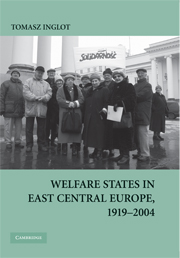Book contents
- Frontmatter
- Contents
- Figures and Tables
- Acknowledgments
- Welfare States in East Central Europe, 1919–2004
- Introduction: Understanding Past and Present Social Policy Development in East Central Europe
- 1 The Welfare State in East Central Europe: A Conceptual and Theoretical Reconsideration
- 2 Institutional Legacies: State Building, Regime Change, and the Development of National Welfare States in Czechoslovakia, Poland, and Hungary, 1919–1989
- 3 Policy Legacies and Welfare States under Communism: Cycles of Social Policy Expansion and Retrenchment in Czechoslovakia, Poland, and Hungary, 1945–1989
- 4 Historical Legacies, Welfare State Institutions, and the Politics of Social Policy Reforms in Postcommunist East Central Europe, 1989–2004
- Conclusion: Postcommunist “Emergency” Welfare States and Theoretical Exploration of Institutional Change and Social Policy Development
- Bibliography
- Index
4 - Historical Legacies, Welfare State Institutions, and the Politics of Social Policy Reforms in Postcommunist East Central Europe, 1989–2004
Published online by Cambridge University Press: 25 July 2009
- Frontmatter
- Contents
- Figures and Tables
- Acknowledgments
- Welfare States in East Central Europe, 1919–2004
- Introduction: Understanding Past and Present Social Policy Development in East Central Europe
- 1 The Welfare State in East Central Europe: A Conceptual and Theoretical Reconsideration
- 2 Institutional Legacies: State Building, Regime Change, and the Development of National Welfare States in Czechoslovakia, Poland, and Hungary, 1919–1989
- 3 Policy Legacies and Welfare States under Communism: Cycles of Social Policy Expansion and Retrenchment in Czechoslovakia, Poland, and Hungary, 1945–1989
- 4 Historical Legacies, Welfare State Institutions, and the Politics of Social Policy Reforms in Postcommunist East Central Europe, 1989–2004
- Conclusion: Postcommunist “Emergency” Welfare States and Theoretical Exploration of Institutional Change and Social Policy Development
- Bibliography
- Index
Summary
[S]ocial order, as it exists today, had been created in each country in its own, specific historical way. I was always amazed to see how many welfare elements of the Vasa monarchy remained in social-democratic Sweden…. Social democrats recently lost the elections but it does not seem their model of the welfare state will change much. Well, we also have our own historical road…. we experienced real socialism…. I believe that you cannot take away certain social rights from people, you can modify them, change the method of implementation, make them more rational … but to say simply – you are not entitled to them any more – it cannot be done.
Jacek Kuroń, Polish Minister of Labor and Social Policy, 1989–1990 and 1992–1993 (my translation)I see [social policy] reforms as a long process … that lasts many years … and resembles a relay race. It would be a disaster for the … state if every next governmental team had to begin from scratch, negating the accomplishments of their predecessors.
Andrzej Ba¸czkowski, Polish Minister of Labor and Social Policy (interview, August 1996) (my translation)[F]rom the mid-seventies on, the ideological politicians slowly became technocrats. The last Kádár government were essentially technocrats. The last two Kádár governments were not that different in that regard from those people in power now…. They are “nice” technocrats, they are adjusting to whatever ideology there is.
Hungarian welfare expert Zsuza Ferge, commenting on postcommunist social policy reform (interview, September 1996)- Type
- Chapter
- Information
- Welfare States in East Central Europe, 1919–2004 , pp. 211 - 305Publisher: Cambridge University PressPrint publication year: 2008



